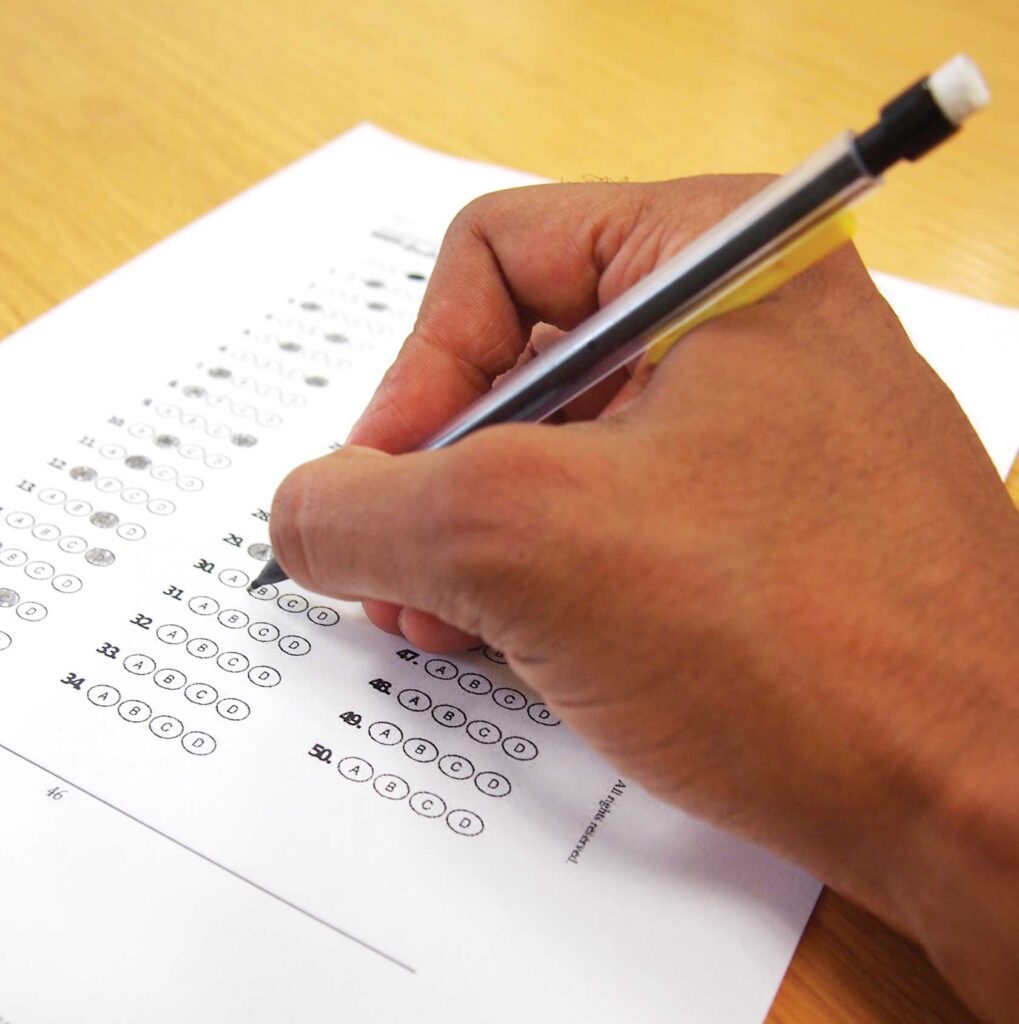Ballot effort aims to end MCAS graduation requirement
Teachers union hails effort to move from high-stakes testing

Flexing its political muscle, the Massachusetts Teachers Association turned in 135,000 signatures, far more than expected, to the Secretary of State’s office in support of a ballot question that intends to remove the controversial high school graduation requirement tied to MCAS testing.
MTA president Max Page said the show of political clout symbolizes that the public’s voice is loud and clear that they stand with educators against high-stakes testing.
“Our stance against an accountability system solely based on high-stakes testing resonates with the community, highlighting the need for change in how we evaluate student achievement,” Page said. “It’s time to move past a 30-year-old system that narrows learning and fails to address diverse student needs.”
Reforming MCAS has been a hot education topic in education and legislative circles for years, with some opponents charging that the test is unfair to marginalized students. But now, Page and others want to put the controversial matter of ending the test before voters.
Page, in an interview, said MCAS has done enormous harm to students of color, students with disabilities, and students who are English learners.
“It just limits the opportunities people have,” he said.
He said the teachers association has long been hearing from its members about how the requirement limits their work as professional educators.
“[It] narrows the curriculum and harms lots of students. There are over 700 students each year who pass all their classes, do everything right, but may miss a passing score [on] one of these tests and will not get a diploma — that has lasting impacts over their entire lives,” Page said.
He also noted that if this ballot question is successful, the MCAS test will still be offered, as it is a federal requirement to have yearly standardized tests.
“If there’s some value to having a standardized test, … [it would be that] it won’t have the destructive high-stakes impact on schools and students’ lives,” he said.
At a rally recently, members of the teachers association gathered on the State House steps with boxes of the 135,000 signatures gathered in support of the ballot question. During the press conference, parents and educators spoke about the importance of their ballot initiative.
Deb McCarthy, vice president of the MTA, said that the organization is teaming up with the National Education Association to decouple federally mandated statewide student assessment from high-stakes consequences, and to ensure that no one measure is used to determine a student’s access to success.
“Massachusetts is regarded not only as a national leader on education,” McCarthy said, “Massachusetts is also regarded as a leader in a national campaign to reset an accountability system that continues to leave thousands of children behind. Massachusetts once again leads the way with this ballot initiative that will remove the punitive high-stakes fluctuating metric of a test score with the attainment of a high school diploma.”
Lexington parent Shelley Scruggs, who has a sophomore studying at a vocational school, has been helping to lead the ballot initiative matter.
“This is about righting a wrong. Over the last six or seven weeks, I canvassed for signatures in Acton, Arlington, Bedford, Billerica and Lexington,” Scruggs said. “Overall, I saw overwhelming support among parents, teachers as well as former students, for basic fairness, in terms of testing and education.”
She added that “a one-size-fits-all approach” heavily favors wealthier communities and academically gifted children, leaving students who are less well off or have different learning abilities “out in the cold.”
“Denying them a diploma is … disheartening and demoralizing … all because they did not pass a single one test,” she said.
Dayshawn Simmons, president of Somerville Educators Union, said his union hosted many events and honest conversations with residents about the impact of high-stakes testing.
“As I spoke with many [residents], I learned that most do not know that a student can complete every other requirement asked of them, fail one test, and not be eligible for graduation or to receive a high school diploma,” Simmons said.
He said that the test increases “the inequalities we see in our school system.”
As a middle school educator, Simmons said he has seen firsthand how the reading passages on standardized tests make assumptions about students’ lived experience, and the irreparable harm that comes with placing this requirement on students.
“It leaves our students feeling defeated. And the message is told to them that if you don’t pass that you will be unsuccessful. That is not only a downright lie, but it tells our students they’ll never be good enough, based on one singular assessment. Our students deserve an assessment that allows them to thrive with our current requirements. There are too many students that ultimately drop out rather than earn a high school diploma,” he said.






